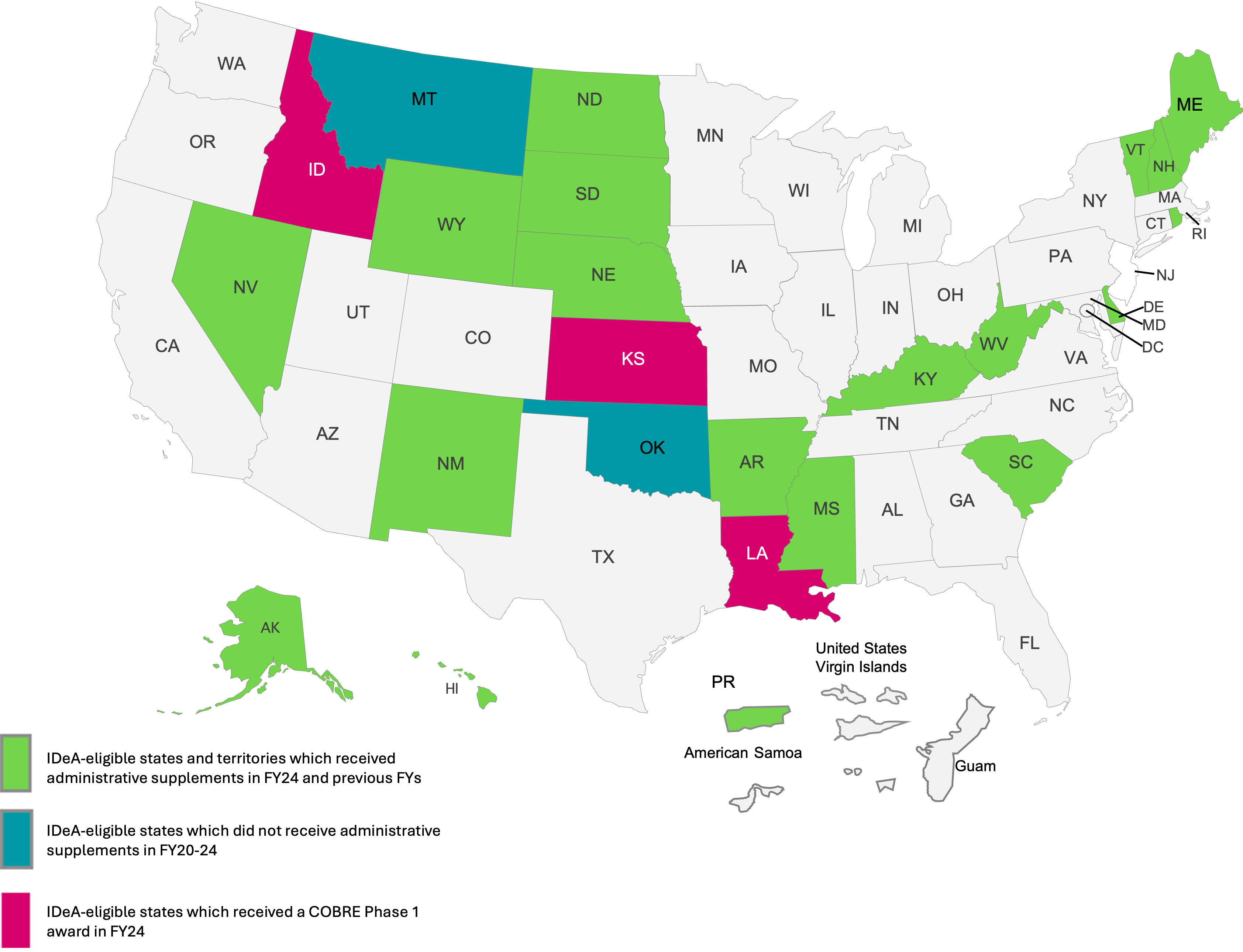IDeA-eligible states: Alaska, Arkansas, Delaware, Hawaii, Idaho, Kansas, Kentucky, Louisiana, Maine, Mississippi, Montana, Nebraska, Nevada, New Hampshire, New Mexico, North Dakota, Oklahoma, Rhode Island, South Carolina, South Dakota, Vermont, West Virginia, Wyoming, and Puerto Rico.
Supporting Women’s Health in IDeA States
Since 2020, ORWH has partnered with the National Institute of General Medical Sciences (NIGMS), along with other participating NIH Institutes, Centers, and Offices (ICOs), to advance women's health research by expanding research and research capacity in IDeA States.
IDeA Program and Background
IDeA States are U.S. states and territories eligible for funding from the Institutional Development Award (IDeA) Program, established in 1993 to strengthen research capacity in states with historically low levels of NIH funding. Managed by NIGMS, the program provides funding mechanisms to help institutions in eligible states improve their research capabilities by supporting faculty development and infrastructure improvements. The program's goal is to enable these institutions to address local health needs, particularly in medically underserved areas. Many IDeA-eligible states experience poorer health outcomes and reduced access to healthcare, especially in rural and underserved communities. Notably, five of the 23 IDeA States—Arkansas, Kentucky, Louisiana, Mississippi, and South Carolina—rank among the ten states with the highest maternal mortality rates.i
ORWH-NIGMS IDeA Program Partnership
In 2020, ORWH and NIGMS collaborated to launch the first IDeA funding opportunities specifically focused on women's health. Together with 12 other NIH ICs, NIGMS and ORWH issued a Notice of Special Interest (NOSI; NOT-GM-20-017) for administrative supplemental funding. This initiative allowed institutions already funded under the IDeA Program to apply for one year of additional funding to conduct research on women's health. The funding opportunity encouraged a wide range of research addressing critical women's health issues throughout the lifespan, including maternal morbidity and mortality and their underlying causes. The response to the NOSI was highly enthusiastic, resulting in the funding of 19 applications with a total award amounting to $4.8 million. Motivated by this positive response, ORWH, NIGMS, and partner ICs released similar administrative supplement opportunities in fiscal years (FY) 2021 and 2022. Examples of the scientific research supported by these administrative supplements include:
Prevention of bone loss in postmenopausal women with osteopenia (University of Delaware)
Study on the interplay of maternal diet and key demographics on neurological health in the rural frontier and remote West (University of Idaho)
Development of antibiotic-loaded nanoparticles for the treatment of bacterial vaginosis in pregnant and non-pregnant women (University of Delaware)
From the program's inception in FY2020 through FY2024, a total of 83 administrative supplements have been awarded, amounting to $23.4 million. Furthermore, 21 out of the 23 IDeA States received at least one administrative supplement.
In October 2022, ORWH and NIGMS launched a new initiative using the IDeA Program's Centers of Biomedical Research Excellence (COBRE) Phase 1 P20 funding mechanism (NOT-GM-23-012). This initiative provides institutions with funding for three sequential five-year phases to develop innovative biomedical research centers, develop a critical mass of investigators capable of competing effectively for independent research funding, and enhance research infrastructure. In fiscal year (FY) 2024, three COBREs awarded to IDeA institutions focused on women's health including:
- Nutrition and Women’s Health (University of Idaho)
- Leveraging Big Data to Improve Women’s Health (University of Kansas Lawrence)
- Sex-Based Precision Medicine (Tulane University of Louisiana)
In FY2025, a new COBRE will be awarded to the University of Arkansas for Medical Sciences. These efforts aim to expand NIH funding distribution for women's health research across the nation and support ORWH's vision of evidence-based, personalized disease prevention and treatment for every woman.
The inaugural NIH Symposium on Women's Health Research in IDeA States, held in 2024, was a collaborative initiative by ORWH and NIGMS. The symposium aimed to promote networking, knowledge exchange, and to spotlight the significant contributions to women's health research from the IDeA States. The event featured presentations from 16 investigators, covering a wide array of women's health issues across the lifespan, including maternal health, based on research from fiscal years 2020 and 2021. The following resources from the symposium are available:
The upcoming 2025 NIH Symposium on Women’s Health Research in IDeA States will be held on September 16, 2025, and will showcase research conducted from 2023-2024 by investigators dedicated to advancing women’s health. Register to attend the symposium.
iWorld Population Review. Maternal Mortality Rate by State. https://worldpopulationreview.com/state-rankings/maternal-mortality-rate-by-state.


